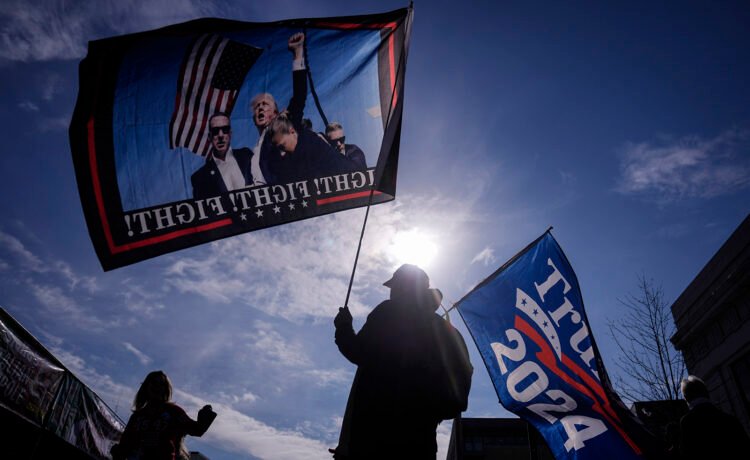(RNS) — Like every other high-quality survey, the topline results of the American Values Survey from the Public Religion Research Institute show the presidential election — at the national level and in the battleground states — as a toss-up. Moreover, the PRRI data generally confirms earlier Pew Research Center polling showing that vote preferences among major religious groups in the country have remained remarkably stable across the Trump era.
Despite all of former President Donald Trump’s coarseness, misogyny, convictions for sexual assault, explicit racism and demonization of immigrants, PRRI finds that all white Christian subgroups continue to support Trump at comparable levels to 2020: white evangelical Protestants at 83%, white nonevangelical Protestants at 60% and white Catholics at 61%. At the other end of the spectrum, 85% of Black Protestants, 70% of the religiously unaffiliated and 61% of Latino Catholics are supporting the Democratic nominee, Vice President Kamala Harris.
But while the continued support for a candidate like Trump among the white voters who formerly demanded to be known as “values voters” is telling (and appalling), the horse race numbers are not the ones that most concern me. I’m more deeply worried about a set of findings that document support for a toxic cocktail of anti-democratic sentiments that include support for Christian nationalism, authoritarianism, racism, xenophobia, political violence and even a potential coup should Trump not win the election.
Here are five findings that illustrate the dire threats to a pluralistic democracy we will continue to face no matter who wins the presidential election on Tuesday (Nov. 5).
Christian nationalism
While two-thirds of the country rejects the tenets of Christian nationalism, 3 in 10 Americans can be classified, according to categories developed by PRRI, as Christian nationalism adherents (fully agreeing with these tenets) or sympathizers (agreeing but less strongly). Moreover, a majority of Republicans (55%) are Christian nationalism adherents/sympathizers, as are two-thirds of the white evangelical Protestant base of the GOP. When Trump rails about threats to “our religion” and “our country,” he’s talking exclusively to his white Christian base.
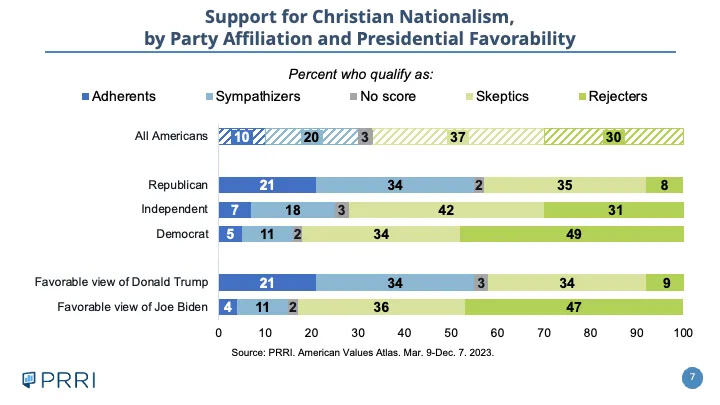
“Support for Christian Nationalism, by Party Affiliation and Presidential Favorability” (Graphic courtesy of PRRI)
Authoritarianism
PRRI developed a Right-Wing Authoritarianism Scale, adapted from work first done in “The Authoritarian Personality,” published by sociologist Theodor Adorno and other researchers in 1950 in the wake of the horrors of fascism in the Second World War. PRRI finds that while most Americans do not hold highly authoritarian views, a substantial minority do: 43% of Americans score high on the RWAS.
Two-thirds of Republicans score high on this authoritarianism scale (67%), compared with 35% of independents and 28% of Democrats. Notably, Republicans who hold favorable views of Trump are 36 percentage points more likely than those with unfavorable views of Trump to score high (75% vs. 39%). White evangelical Protestants (64%) are the religious group most likely to score high on the RWAS, followed by smaller majorities of Hispanic Protestants (54%) and white Catholics (54%) — all groups who supported Trump over Joe Biden in 2020.
Support for authoritarianism is not a “Christian in name only” phenomenon. A majority of weekly churchgoers (55%) score high on the RWAS, compared with 44% of Americans who attend church a few times a year and 38% of those who never attend church services. More-frequent church attenders are more likely than nonattenders to hold both Christian nationalist and authoritarian views.
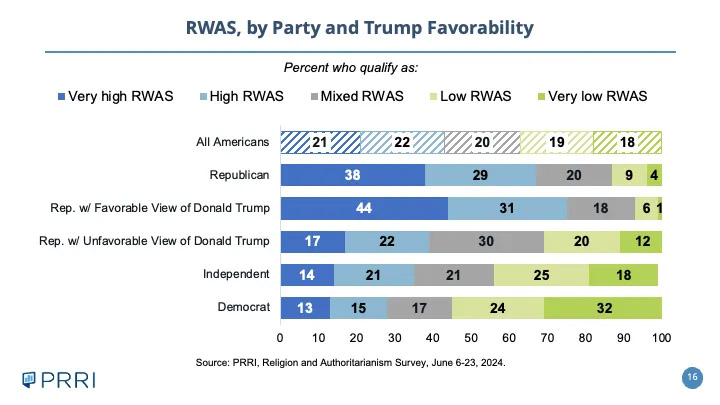
“RWAS, by Party and Trump Favorability” (Graphic courtesy of PRRI)
Racism and xenophobia
One of the most chilling tropes Trump has added to his increasingly fascist rhetoric in 2023-2024 is the assertion that immigrants entering the country illegally are “poisoning the blood of the country.” This racist and dangerous rhetoric is lifted straight from the pages of Adolf Hitler’s “Mein Kampf,” which includes more than 150 references to the purity of a nation’s blood in passages like this one: “All the great civilizations of the past became decadent because the originally creative race died out, as a result of contamination of the blood.”
When we asked about Americans’ support for this idea, the American Values Survey revealed a familiar pattern. While two-thirds of the country reject this fascist rhetoric, 6 in 10 Republicans (61%) and 6 in 10 white evangelicals (60%) now embrace it. Six in 10 Christian nationalism adherents and sympathizers (60%) also say that immigrants entering the country illegally are poisoning the blood of the country, compared with 22% of Christian nationalism rejecters and skeptics.
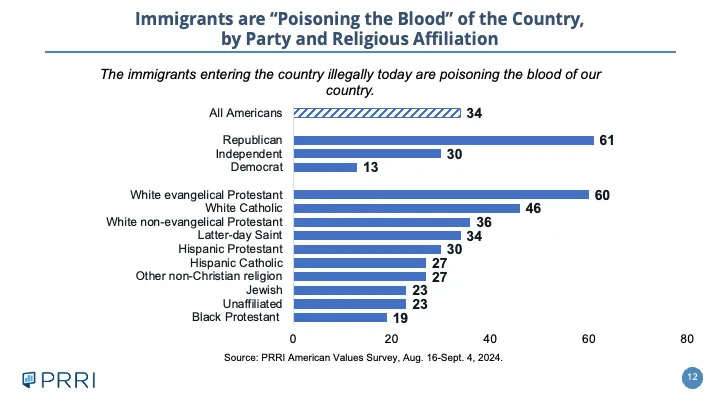
“Immigrants are ‘Poisoning the Blood’ of the Country, by Party and Religious Affiliation” (Graphic courtesy of PRRI)
Political violence
The American Values Survey asked three questions related to potential political violence, and each revealed roughly the same pattern of attitudes. Nearly 3 in 10 Republicans (29%) believe that true American patriots may have to resort to violence to save the country, compared with 16% of independents and 8% of Democrats.
Republicans (27%) are twice as likely as independents (14%) or Democrats (12%) to agree that armed everyday citizens should be poll watchers, even if this makes some voters uncomfortable.
Republicans (22%) are far more likely than independents (14%) or Democrats (12%) to agree that “if the 2024 presidential election is compromised by voter fraud, everyday Americans will need to ensure the rightful leader takes office, even if it requires taking violent actions.” Given that 6 in 10 Republicans continue to believe Trump’s Big Lie that the 2020 election was stolen from him, belief in the premise of voter fraud is basically baked into 2024, making this question particularly disturbing.
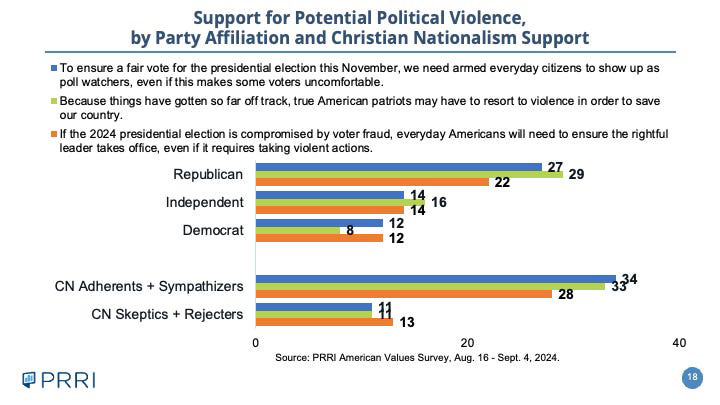
“Support for Potential Political Violence, by Party Affiliation and Christian Nationalism Support” (Graphic courtesy of PRRI)
A potential coup
Nearly 1 in 5 (19%) Republicans agree that “if Donald Trump is not confirmed as the winner of the 2024 election, he should declare the results invalid and do whatever it takes to assume his rightful place as president.” Notably, Republicans who view Trump favorably are five times as likely as Republicans who hold unfavorable views to agree (23% vs. 5%). Similarly, more than 1 in 5 Christian nationalism adherents or sympathizers (22%) believe that if Trump is not declared the winner, he should do whatever it takes to assume the presidency.
And support for a potential political coup is even higher among those who believe that people convicted for their criminal roles during the Jan. 6, 2021, insurrection are really patriots who are being held hostage by the government (30%) and among those who believe the 2020 election was stolen from Trump (26%).
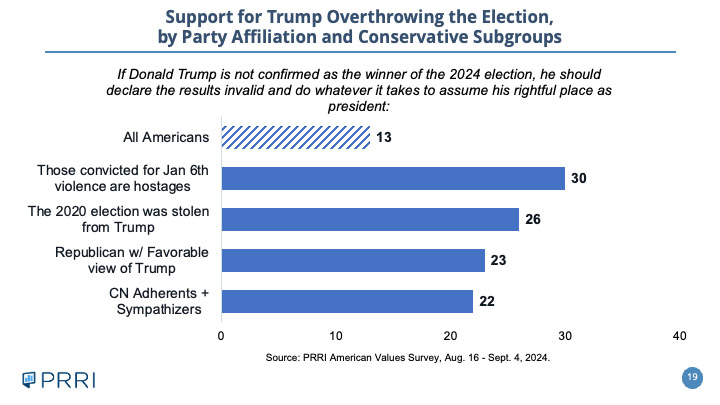
“Support for Trump Overthrowing the Election, by Party Affiliation and Conservative Subgroups” (Graphic courtesy of PRRI)
The threat: fascism, not polarization
These findings are chilling. But even with the warning signs all around us, we’ve had trouble diagnosing our current situation and grasping its gravity. We have too often, and too conveniently, mischaracterized our nation’s biggest political problem as polarization. But the principal danger we face is not division itself but the emergence of a new American form of fascism, wrapped in the flag and justified by a white Christian theology of dominion.
Through its takeover of the Republican Party under Trump, that once-vanquished toxic ideology now threatens to metastasize further than most of us anticipated was possible. When such an anti-democratic movement arises, channeled by a charismatic leader and fomented by a significant minority of our fellow citizens, we should be divided. A healthy democracy will respond with antibodies to resist such an onslaught.
For many Americans, love of country distorts our ability to see threats clearly. We desperately try to calm our fears by averting our eyes from the plain facts before us. We take it as an article of faith that fascism or Nazism cannot happen here. But deep down, we know that what we are witnessing is not normal. We sense that something is amiss.
I am still hopeful, although I cannot say I am optimistic, that enough of us love our country enough to listen to that still small voice. I am heartened by the scores of prominent Republicans and former Trump administration officials who have done so. Courageous resistance, where single voices swell into a deafening chorus of “never again,” is the only way fascism does not take root in America now.
(Robert P. Jones is president and founder of the Public Religion Research Institute and the author, most recently, of “The Hidden Roots of White Supremacy and the Path to a Shared American Future.” This article first appeared on his Substack newsletter. The views expressed in this commentary do not necessarily reflect those of RNS.)
You Might Also Like
New book calls for authentic engagement and equity in organizations
The Nine Asks by Kimberly Danielle Organizations have a responsibility to ensure that people who come there to work, worship,...
‘Holy Hurt’ is Hillary McBride’s field guide to the shattering impact of spiritual trauma
(RNS) — Trauma is a lot like having a shard of glass in your hand, explains clinical psychologist Hillary McBride....
So You Married a Priest? + Beth Allison Barr
It’s ministry by marriage. Did you know there are piles of guidebooks meant to help women excel at...
Abyssinian Baptist Church welcomes dismissal of pastor candidate’s discrimination suit
(RNS) — A federal judge has dismissed a gender discrimination lawsuit brought against Abyssinian Baptist Church by a onetime candidate...





